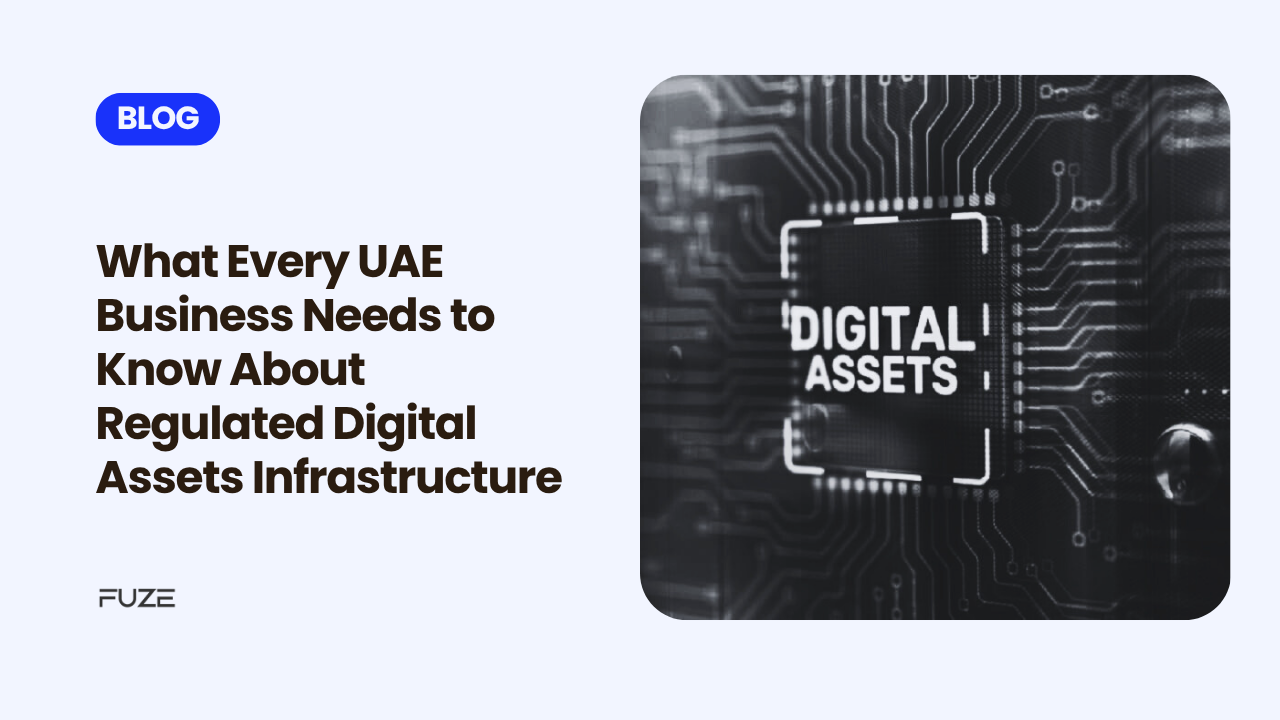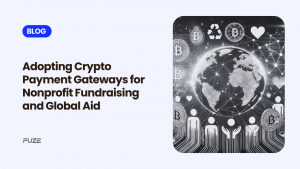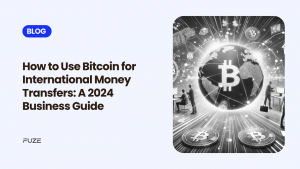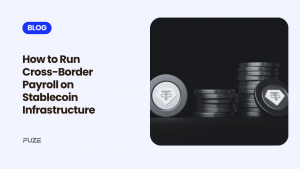If you have lately been following news in technology and finance, you have most likely heard a lot about digital assets. For most UAE companies, however, the genuine concern is: how will this impact us? More significantly, though, how do we engage lawfully and safely?
One important phrase will help to explain the solution: controlled digital asset infrastructure. It is not only a buzzword. It is the basis that lets companies utilize blockchain-based services and digital currency without running unneeded risk.
Let’s dissect it to understand why this is important, especially if you run a corporate, a fintech company, or a UAE-based enterprise going ahead.
Why Are Digital Assets Rising in Business Priority?
Digital assets these days are not only bitcoins. Among additional blockchain-powered tools are stablecoins, tokenized securities, and central bank digital currencies (CBDCs). They have benefits:
- Quicker payback of debt
- Reduced cross-border transaction expenses
- more openness and trackability
- Availability of fresh investment sources and liquidity choices
Businesses in trade, payments, real estate, finance, and even e-commerce have substantial opportunities. But without the necessary infrastructure to enable it, opportunity is not very meaningful.
What Is Regulated Digital Assets Infrastructure?
Consider it as the operational, technical, and legal framework enabling companies to use digital assets with safety.
This infrastructure in the UAE is created via:
- Brokers and licensed guardians
- Safe OTC (over-the-counter) trading systems
- Blockchain settlement systems
- Authorities including VARA, ADGM, and DFSA have set regulations.
It’s what distinguishes responsible innovation from high-risk speculating. Companies now have access to properly licensed platforms with compliance, openness, and institutional-grade capabilities instead of unbridled cryptocurrency exchanges.
Key Components of the Infrastructure
Let’s examine the fundamental building blocks closer up:
Custody Solutions
Solutions for Custodial Protection of highly valuable assets depends on safe digital asset custody. These services guarantee digital currencies are kept securely by use of technology including hardware security modules (HSMs) or multi-party computation (Mpc).
OTC Trading Platforms
OTC desks give companies managing significant volumes a safe and discreet space to trade digital assets with minimum market slippage.
Tokenization Engines
These let businesses produce tokenized copies of actual assets like commodities or real estate, therefore boosting liquidity and streamlining ownership transfer.
Compliance and KYC Tools
KYC tools and compliance Robust compliance layers, automated KYC/AML systems, and real-time monitoring, as part of regulated infrastructure help to guarantee transactions satisfy local and global criteria.
Blockchain Integration
Enterprise-grade APIs and connectors let companies handle digital assets and settle transactions without having to be blockchain experts.
The UAE’s Unique Regulatory Advantage
The UAE’s progressive legal posture is one of the factors driving it to become a worldwide center for digital assets. Authorities here actively shape digital asset innovation, rather than letting it flourish.
Driving the UAE ahead is this:
1. Active Control Authorities
Clear policies for digital asset service providers have come from bodies like the Abu Dhabi Global Market (ADGM) and the Dubai Virtual Asset Regulatory Authority (VARA). This provides companies hope of investigating free from legal uncertainty.
Setting detailed licensing rules that guarantee operational security, consumer safety, and market integrity, VARA in Dubai ADGM’s structure in Abu Dhabi consists of a complete digital asset policy, custody guidelines, and trading clauses.
2. Legal Transparency for Companies
The UAE boasts systems designed to allow tokenization, stablecoins, and licensed digital asset operations. Legal certainty exists whether it’s a family office trying to hedge with stablecoins or a fintech printing tokenized instruments.
3. Complementarity with Conventional Banking
UAE authorities are pushing integration rather than isolating crypto and conventional finance. This makes digital assets possible to coexist with conventional banking systems, therefore enhancing access and lowering conflict.
From cross-border remittances to programmable money pilots, banks and fintechs are today working on initiatives combining traditional and blockchain finance.
Why UAE Companies Should Pay Attention
Not simply for crypto-native businesses, regulated digital asset infrastructure serves other purposes. It’s for any company managing assets, payments, or foreign business.
Here is what is at risk:
- Speed: Traditional payment rails take days. Settlement based on blockchain technology can take minutes.
- Cost: Remove the intermediaries’ costs from worldwide transfers.
- Security: Platforms and licensed custodians provide institutional-grade asset protection.
- Innovation: Create or combine innovative business concepts such as tokenized real estate or integrated financing.
You either run great danger or are locked out of these advantages without controlled infrastructure.
Real-World Applications in the UAE
The UAE not only is developing infrastructure but also makes active use of it. These are some instances of how companies are already using controlled digital assets:
Real Estate
Using stablecoins for cross-border payments, real estate property developers are providing faster settlements to overseas investors. Fractional ownership made possible by tokenized real estate projects also opens the path for fresh investment ideas.
Trade and Logistics
Blockchain solutions let commerce and logistics import-export companies tokenize invoices and settle trade faster with stablecoins. Better cash flow management and less dependence on banking middlemen follow from this.
Corporate Treasury
Part of their balance sheets are controlled stablecoins held by corporate treasury companies to diversify cash reserves and offset currency volatility.
Remittances and Payroll
Payroll systems based on stablecoins are being tested by remittances and payroll Gulf-based businesses dealing with abroad contractors in order to save transfer delays and avoid FX translation costs.
How Fuze Enables Safe Access to Digital Assets
At Fuze, we offer the tools companies in the UAE and more general MENA areas need to access digital assets safely and legally.
Our site comprises:
- An OTC trading desk licensed for big-volume stablecoin and cryptocurrency trades
- Institutional-grade protection of digital assets
- Customized infrastructure for including digital assets in your company’s operations
- Regulatory congruence among VARA, ADGM, and world standards
Fuze provides a reliable portal into the realm of controlled digital assets regardless of your position, that of company treasurer controlling liquidity or CFO investigating cross-border payment options.
We deal directly with your team to:
- Know your particular industry’s requirements.
- Provide a compliant access plan.
- Support trade, custody, and settlement.
- Digital assets provide you the advantages without the uncertainty or risk sometimes connected with retail systems.
Next Actions for Businesses:
Here’s a simple checklist should you be thinking about investigating digital assets:
- Evaluate your company’s payments, treasury, trade finance, investment, or payroll use case.
- Select a licensed partner such as Fuze who is aware of local laws and business requirements.
- Start with low-risk, under-control assets like stablecoins.
- Verify internal policies on compliance, risk management, and custody are current.
Though the market is changing quickly, your company can keep ahead with the correct strategy.
Looking Ahead
Digital assets will become as normal as Internet banking is now as blockchain technology develops. The issue now is not whether your company should become involved but rather how best to do it.
UAE companies may move quickly without breaking anything with the correct infrastructure and regulatory certainty.
And that is where Fuze finds application.
Disclaimer: Virtual assets carry significant risks, including high volatility and potential loss of Disclaimer: Virtual assets carry significant risks, including high volatility and potential loss of your entire investment. They are not backed by governmental protections, and recourse may be limited in case of loss. Always assess your risk tolerance, fully understand the risks, and seek independent financial advice if needed before investing.
FAQs
- What is digital asset infrastructure?
It refers to the platforms, tools, and regulatory frameworks that allow safe and legal use of digital currencies and blockchain-based assets by businesses.
- Is using digital assets legal in the UAE?
Yes, as long as you’re working through licensed platforms under regulators like VARA, ADGM, or DFSA. The UAE has a clear legal framework for compliant activity.
- How is Fuze different from regular crypto exchanges?
Fuze offers institutional-grade access tailored for businesses, not retail users. This includes compliance-first OTC trading, secure custody, and full regulatory alignment.
- Can traditional businesses benefit from digital assets?
Absolutely. Digital assets can speed up payments, lower cross-border costs, provide new financial instruments, and improve treasury operations.
- What should a business do before using digital assets?
Start by choosing a licensed provider like Fuze. Make sure your use case is clear, including payments, investment, and treasury, and ensure it fits within UAE regulatory guidelines.







